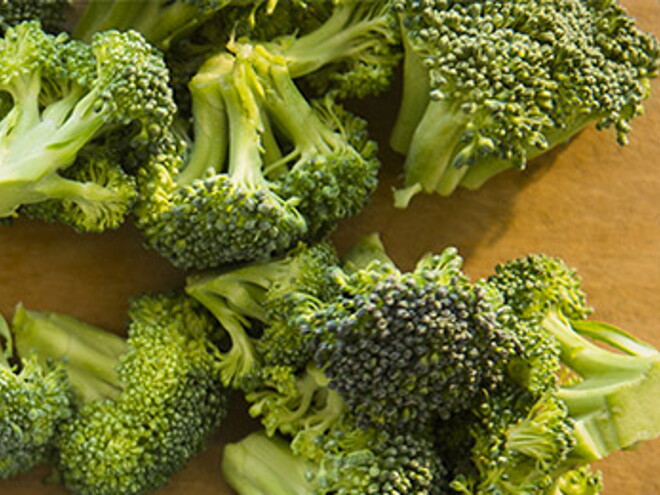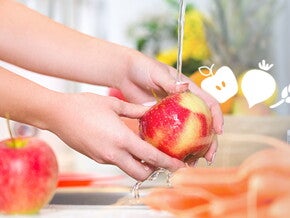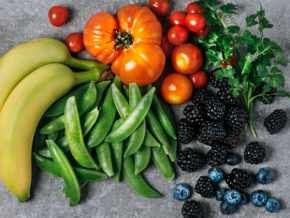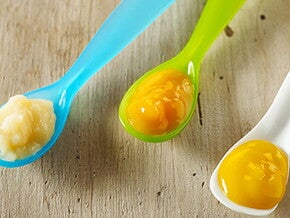
N(uts)
Nuts are a good source of protein, dietary fibre, zinc, magnesium and potassium. However, nuts, especially peanuts (groundnuts) can cause allergic reactions to some individuals, or even fatal events, known as anaphylactic shock. Thus, avoidance of peanuts is required to susceptible individuals who are medically-diagnosed with peanut allergy. Tree nuts are generally safe for consumption.
For babies and young children aged below two, it was once advised to avoid eating peanuts. This practice was revoked recently as compelling evidence has shown that children who avoid peanut-containing foods were more likely to have peanut allergy than those who consumed them in the first year. Introducing peanut-containing foods earlier in life appears to exert protective effects against peanut allergy. However, Health Experts advise that at-risk babies should be evaluated by an allergy specialist before introducing them to peanuts. If parents are in any doubt, they should consult their pediatricians before introduction.
While nuts may potentially cause choking to the weaning child, parents and caregivers are reminded to take extra caution when feeding him/ her with chopped nuts.
O(mega 3, 6 & other fatty acids, ARA)
Omega-3 & 6 fatty acids have been shown to improve immunity, memory, behaviour and intelligence in children. Two essential fatty acids, alpha-linolenic (omega-3) and linoleic (omega-6), are important for your child’s growth, brain and eye development. Our bodies do not make these acids so we have to get them from our diet. EPA and DHA are two other important omega-3 fatty acids that can be converted from alpha-linolenic acid in the body.
To meet your child’s daily needs of omega-3 and 6 fatty acids, oily fish such as salmon, mackerel, sardines and tuna are good sources. For children who do not eat fish, alternatives are eggs and milk.
P(rotein)
Protein is an essential nutrient that is present in every cell in the body. They help grow and maintain body tissues. Everyone, especially children, needs to eat protein daily for optimal growth. Breastfeeding is highly recommended from birth, and to be continued after 6 months. Many parents may supplement breast milk with formula milk. These formulas typically provide higher amounts of protein than breast milk.
Protein is mainly found in meat, poultry, fish and seafood, dairy products, eggs, nuts and seeds. It is important to moderate protein intake because excess protein is unnecessary and can increase the risk of health problems later on in life.
Check with your paediatrician or dietitian on whether your child is receiving adequate amount of protein.
Q(uestion) about first foods
Weaning foods are only to be introduced from 6 months onwards. Here are some signs to show that your baby is ready for their first solid foods:
- Able to stay in a sitting position and hold their head up steadily without support
- Able to co-ordinate their eyes, hands and mouth to pick food up and put it into their mouths
- Able to swallow food. Babies who are not ready will push food back out with their tongue.
Every baby is different and will develop at their own pace. At 6 months, offering different food tastes and textures encourages food acceptance.
R(ecommended Dietary Allowance) - RDA
The Recommended Dietary Allowances (RDA) are reference values for certain nutrients determined for different gender and age groups. It is a useful indication of how much nutrients a healthy individual needs to meet his/her daily requirements.
Recommended Dietary Allowance for Normal Healthy Children in Singapore

You can refer to the following website for more information on the recommended daily allowance of nutrients for your toddler: https://www.healthhub.sg/live-healthy/192/recommended_dietary_allowances.
S(ugar)
Can my child eat sugar?
The sugar referred to here is sucrose, the white sugar. It is also called added sugar. Sugar is often added to highly processed food like fruit juices, snacks and desserts. Health experts recommend that young children should not consume too much added sugar, knowing that the sweet taste preference can be developed from a very young age. Excess sugar can cause tooth decay in children, lead to weight gain and health problems later in life. However, sugar in small amounts is not all bad for children. The better alternative is to use food with natural sweetness like fruits, sweet potatoes, pumpkins and carrots.
Baby steps to control sugar intake
When looking at food product labels, check the ingredient list for added sugars such as sucrose, fructose or glucose syrup as these are ingredients that help to sweeten the product. Look for low sucrose or no-added sucrose options (endorsed with the Healthier Choice Symbol) for your child.
T(aste & textures)
Once your baby is enjoying smooth food textures, offer new tastes and other textures. Your baby will learn new feeding skills by managing the different textures. Some babies need:
- to taste certain foods on several different days before they learn to like it
- more practice with new textures before they master eating them and are ready to move on
Keep offering foods, even if your baby seems reluctant to eat them at first. However, allow your baby to decide when he/she has had enough to eat. This will be indicated by turning their head away, keeping their mouth shut, or refusing to swallow the food in their mouth.
U(nsaturated fats)
Not all fats are bad! We need fats for healthy growth and development of a child and it is crucial to differentiate the types of fats.
The good fats are the unsaturated fats. They are good for the heart and are required for normal body functions.
- Monounsaturated fats are found in olive oil, canola oil, peanut oil, avocado and most nuts
- Polyunsaturated fats are found in oily fish such as salmon, mackerel, sardines, most nuts and seeds
The bad fats are rancid and trans fats in food and vegetable cooking oils. They increase the risk of heart disease and other cardiovascular problems.
- Saturated fats are found in:
- animal products like poultry skin, meat fat, butter, ghee
- full-cream dairy products, coconut milk and coconut oil
- snack food like cookie, chocolate, pastries
- coconut oil
- Trans fats are produced when vegetable oils are hardened to lengthen shelf life and are found in highly processed foods like hard margarine and food cooked with them: cookies, doughnuts, pies and cakes.
For your child’s good health, replace the bad fats as often as you can with the good fats.
V(egetables & Fruits)
A diet supplemented with the recommended amount of vegetables and fruits can provide essential vitamins, minerals and fibre for growth and development.
What parents can do
Offer your toddler the following amount of fruits and vegetables shown in the table every day.
| SERVINGS | MEASUREMENTS / PER SERVING | |
|---|---|---|
| Vegetables | 2-3 |
|
| Fruits | 2-3 |
|
Fruit and vegetable servings can be from fresh, frozen or pureed canned foods, but need to be cut up into small, easy-to-eat pieces. Remember you can still serve purees in toddler-favourite foods to add variety. Children are more likely to eat the recommended amount of fruit for the day as compared to vegetables due to natural sweetness of fruits. Try and offer many different varieties in a lot of different colors.
Kid friendly vegetables include peas, carrots, cabbage, mushrooms and asparagus.
W(ater)
A child between the ages of 1 to 3 years requires 1 to 1.5 litres of fluids a day (Tan, n.d.). This includes milk, water, fresh juices and other fluids such as soups.
The best way to tell if your toddler is getting enough fluid is to check his urine. If he is drinking adequately, his urine will be light yellow and colourless with 4-6 wet diapers a day.
Water plays many vital roles in the body:
- Maintains body temperature
- Removes waste products in the urine
- Moves nutrients throughout the body
- Reduces constipation
- Decreases occurrence of urinary tract infections
It is not a good idea to give your child more than the recommended amount. It raises the risk of water intoxication and reduces his appetite for solid foods, which contain essential nutrients.
XII month milestone
Your baby’s first big birthday has arrived!
As you get ready for this significant milestone, think back on the last 12 months as a time of incredible growth and development for both you and your little one.
At one year, your baby needs the extra fat for healthy brain growth and development. Low-fat milk or foods should still be put on hold until after your baby’s second birthday, or advised by your pediatrician.
As you now start to also introduce your baby to a wider array of different foods, you can consider chopping or mincing them up while still ensuring that they are of an appropriate consistency. Now that your baby is eating more table foods, be very careful about choking hazards. Avoid feeding them whole grapes, nuts, raisins, or foods that could potentially get stuck in their throat.
Y(ogurt)
Yoghurt is a dairy product produced by fermenting milk with bacteria. The bacteria produces lactic acid, which gives the yoghurt its sour taste and causes the milk protein to gel, that is characteristic of yoghurt. Yoghurt can be introduced after 6 months.
Yoghurt is nutrient-dense. It is a great source of protein and calcium. Babies and toddlers have small tummies so they are unable to eat a lot at one time. Therefore, feeding them small portions of nutrient-dense foods is important.
Yoghurt is easy to digest. The fermentation process breaks down most of the lactose, making yoghurt more easily tolerated than other dairy products.
Some yoghurts contain probiotics, which are live cultures. They are good for health, especially for the digestive system. Look for products that say ‘contains live active cultures’, not ‘made with live active cultures’ because the latter does not guarantee it still contains live cultures.
Z(inc)
Zinc is a mineral that plays vital roles in the body. It helps with wound healing, makes new cells and enzymes and helps to process carbohydrate, protein and fat in food.
Other important bodily functions include blood formation, taste perception and maintaining a healthy immune system, especially for a growing toddler.
It can be found naturally in breast milk, meat, poultry, egg yolk, cheese, yoghurt, legumes, wholegrain breads and cereals, and other enriched products like formula milk and grains.
By Dr Ang Poon Liat, Paediatrician
Thomson Paediatric Centre
Do you know the A to M of Nutrition? Find out more here!


















